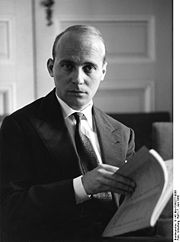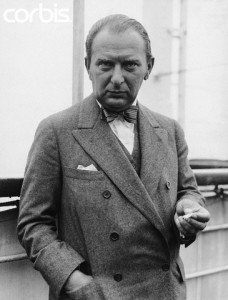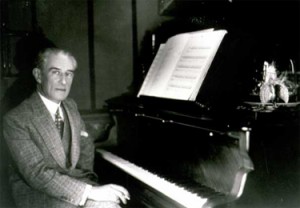Posts By: willcwhite
More on Strauss’s “Metamorphosen”
As is usually the case when I prepare my pre-concert lectures at the Chicago Symphony, I end up with way more information than I can share in the 30 minutes allotted. Here are some extra insights on the Dec. 10 – 12 concert series, featuring the “Metamorphosen” of Richard Strauss. Welcome CSO patrons!
Metamorphosen for 23 solo strings (1945)
Richard Strauss (1864-1949)
During the war years, the German composer Richard Strauss found himself increasingly disillusioned with the world and with himself. He had once been the daring enfant terrible of the musical world, then an upholder of its traditions, finally an elder statesman of German culture. All this came crashing down around him during the Nazi era.

Frankfurt after Allied bombing, home of the Goethe House, which Strauss described as “the most sacred place on earth.”
It is worth exploring in further detail Strauss’s relationship to the Nazi regime. It is true that in 1933, he was named President of the Reichsmusikkammer (Music Bureau) and that in this position he did befriend some high ranking Nazi officials. However, he eventually would use these contacts to save his Jewish daughter-in-law and his half-Jewish grandchildren.
In any case, he never joined the Nazi party and his work always came first in his life: he refused to disavow his collaboration with the Jewish librettist Stefan Zweig and was thus removed from his government post.
from Die Liebe der Danae
Strauss’s mood was poignantly conveyed by an episode in August 1944. His new opera, Die Liebe der Danae was set to premiere at that summer’s Salzburg Festival, but shortly before the opening, all German theaters were closed due to the attempted assassination of Hitler and the declaration of Total War. Strauss was torn with grief, and felt that he would never have a chance to hear his work.
A single open dress rehearsal was negotiated so that Strauss would in fact be allowed to behold his creation. The composer was deeply moved by what he heard and saw, and apparently during the orchestral interlude before the final scene (playing above), he wandered down the aisle to the orchestra pit and exited the hall in a daze. How could anyone not be moved by music of such transcendent beauty:
Strauss’s beautiful orchestral piece Metamorphosen is perhaps our only true insight into his spiritual view of the brutal Nazi regime and its weathering of his soul. However, it is also a display of Strauss’s technical mastery of several themes. The piece opens with a particularly dark theme presented in the celli and basses:
Metamorphosen: first theme

https://www.willcwhite.com/audio/danae.mp3
if you listen carefully, you may also hear the principal counter-theme in the lower cello part:
principal counter-theme

However, Strauss’s main interest in this piece lay not with the first theme that we hear, but with the theme that directly follows it. This principal theme bears a distinct similarity to the Funeral March from the second movement of Beethoven’s 3rd Symphony. It is possible that Strauss meant for this theme to represent the entire history of German musical culture.
Metamorphosen: principal theme

Beethoven Symphony No. 3: funeral theme

This theme undergoes a sort of “metamorphosis” and becomes the third main theme of the piece:
Metamorphosen: 3rd theme

https://www.willcwhite.com/audio/danae.mp3
These themes combine into highly climactic music of raw emotional power:
https://www.willcwhite.com/audio/danae.mp3
and the piece finally concludes with Strauss’s actually quoting Beethoven’s symphony:
https://www.willcwhite.com/audio/danae.mp3
Finally, a mathematical thought: I think it is very likely that Strauss was playing a sort of numbers game in his conception of this piece. Note that it is written for 23 solo strings: a prime number. It is built up of additional primes: 5 first violins, 5 second violins, 5 violas, 5 celli, and 3 basses.
Interestingly, certain conductors — namely Herbert von Karajan, whose recording graces this page — have seen fit to augment the string numbers with additional players. Karajan did this only in the loudest sections, but it still seems to me rather unnecessary, given the fact that Strauss so carefully worked the architecture of the piece to take advantage of every possible combination of the 23 players.
For more information on Strauss, I highly recommend Michael Kennedy’s Richard Strauss: Man, Musician, Enigma, a thoroughly enjoyable read available at amazon.com.
Feel free to leave a note in the comments section to share your opinions of the concert! Also, feel free to peruse the rest of my site at your own risk, in full awareness that hereafter, the Chicago Symphony/Civic Orchestras have nothing to do with the content on this site…
Civic Orchestra Addenda, Dec. 8
As is usually the case when I conduct the research for my pre-concert lectures at the Civic Orchestra, I end up with way more information than I can share in the 30 minutes allotted. Here are some extra insights on the Dec. 8 concert, featuring music of Schumann and Henze. Welcome Civic Orchestra patrons!
Symphony No. 3 (1851)
Robert Schumann (1810-1856)
Confusingly, Schumann’s 3rd Symphony is actually the fourth symphony that he conceived – what we now know as the Symphony No. 4 had been composed a full 10 years earlier; we currently number it fourth because Schumann revised it after completing his 3rd Symphony. Schumann composed the 3rd Symphony as an introduction to his new home of Düsseldorf. It is full of warm spirit, and folk charm.
This is all the more surprising given that Schumann was very cold to his new surroundings and was hardly charmed by the folk. The Board of the Musical Society of Düsseldorf had been very keen to acquire the hot young composer from Dresden, and it was only with significant reluctance that Schumann accepted the post of Music Director.
Certain sights in the Rhineland (for which is Rhenish* symphony is named) did inspire him though. The fourth movement of Schumann’s symphony was inspired by his viewing the Cologne Cathedral, which, as this 1856 photograph clearly shows, was still under construction when he would have seen it:

This cathedral would become the world’s tallest structure from 1880-1884, and it inspired Schumann to compose music that he imagined to be “An Accompaniment to a Solemn Ceremony”.
Symphony No. 3, 4th movement
Schumann did not last long at his post in Düsseldorf, however — it seems that, then as now, a good composer did not necessarily a good conductor make. Apparently Schumann was simply unequipped to bring an orchestra or a chorus up to snuff. Contemporary reports note that he
appeared totally immersed in the score, paying little attention even to the musicians; he lived in the tones.
Schumann became increasingly dissatisfied with his post, noting in his diaries that each rehearsal was “more dreadful” than the last. Musical politics were hardly any better in the 19th century than they are now, and he became particularly paranoid when he read an anonymous review of one of his concerts, “because he suspected the author was a member of the music committee.”
The public themselves didn’t much go in for Schumann’s concerts – they found his programming unfriendly and noted that he was only interested in severe, modern music, i.e. his own, and that of Berlioz, Mendelssohn and Wagner. Audiences today don’t know how good they have it!
Speaking of modern music…
*”Rhenish” has got to be about one of the most delicious words in the English language – particularly because of how much it skews the noun that gave it birth (Rhine).
Symphony No. 8 (1992-3)
Hans Werner Henze (born 1926)

The German-Italian composer Hans Werner Henze was sort of exactly what one expects from a 20th century European musician – scarred by WWII, devoutly Marxist, brazenly homosexual – and his music is a mixture of all this and more.

The central episode of Henze’s life seems to be the major scandal that surrounded the December 1968 première of his oratorio Das Floß der “Medusa” which presented the saga of the Medusa, a ship that had been abandoned by its captain and crew in the early 19th century. Henze (somehow) cast this as a broad political allegory about the life of Che Guevara. So what happened?
The trouble at the first performance … started before a note of the music was heard in the auditorium. Groups of left-wing students showered the audience with leaflets protesting against materialism, the consumer culture and various political causes. A poster of Guevara was put up on the podium, only to be torn down and ripped up by the local director of radio who had organized the concert. The students retaliated by placing a red flag on stage. This provoked complaints form the members of the chorus and an appeal was made to Henze to remove it.
Eventually, people, including the librettist, were beaten and arrested by the police. Apparently 1968 was a tough time to be a classical musician.
Here’s some of what the audience didn’t get to hear that night:
Henze composed his 8th Symphony in the early ’90’s on a commission from the Boston Symphony. It is a highly theatrical work – in fact, the composer took his inspiration from Shakespeare’s A Midsummer Night’s Dream. It is a bit of a lighter work in comparison with it’s immediate predecessor, the Requiem of 1992:
A huge amount of Henze’s extensive output is available on CD, including all of his symphonies up through No. 10 (composed in 2000). You can download much of his music from iTunes here, or you can browse CDs at Amazon here. For those interested in more about Henze’s life, I highly recommend Guy Rickards’ tripartite biography Hindemith, Hartmann and Henze available at amazon.com here.
Feel free to leave a note in the comments section to share your opinions of the concert! Also, feel free to peruse the rest of my site at your own risk, in full awareness that hereafter, the Chicago Symphony/Civic Orchestras have nothing to do with the content on this site…
Surely we can do better than this…?
OK, a while back, I posted a blog entry about poor Esa-Pekka, who had been made to look so egregiously un-handsome by some LA press agent’s legerdemain, and now it’s maybe gotten worse…?

…to the point where I have to suspect that he is consciously choosing to present himself in the least flattering light, perhaps under the assumption that an ever-vivacious 50-something conductor/doyen does not a full-time serious composer make.
But at least he looks way less old-lesbianish in this more recent photo – more grizzled, more rugged, even kind of hot (I mean come on, those eyes…?)
But what, Dear Readers, are we to make of the following image??

To the credit of the New York Philharmonic, they did not choose their new Music Director for his looks. Maestro Gilbert never won any beauty competitions and that’s just fine – I’m sure he more than makes up for it in his probing interpretations. But to the publicity department of the NYP: surely, surely we can do better than this… can’t we?
What happened to the days of composers and conductors having respectable portraits taken of themselves?



And since we’re on the subject: where are the cigarettes in the first two photos?? As the portraits of Mssrs. Reiner, Ravel, and Shostakovich clearly reveal, any adult male classical musician who wants to be taken seriously needs to be photographed smoking a cigarette, regardless of whether he smokes in real life. It wouldn’t hurt him to get his ass over to a piano and procure a large piece of manuscript paper either.
Pitted against their predecessors, the first two photos come of looking pretty amateurish. Of course, certain advanced models should not necessarily be emulated:

Sarafina’s Lament
Revels 2010. In this song, the homely Sarafina sings a lament about how her mother keeps trying to use her as a fundraising tool for the University of Chicago by foisting her on wealthy suitors (I promise you I don’t write the plots for these shows.)
Some girls have mothers who drag them to soccer games
Hooting and howling, galore,
Then there are others who thrust their girls on the stage,
And wait in the wings as their ingénue sings,
And then rush them out the stage door.
Oh how nice it would be
If my mom would do that to me,
But rather than preening, routinging, and primping,
My mother sees me as ripe for the pimping.
So how’s a plain maiden, maternally laiden,
Expected to act like a whore?
Mother you are dreaming,
Mother, I am screaming,
Men at banks will guarantee
That they don’t want a girl like me.
Mother I am trying,
But Mother, I am dying,
How I wish that you could see
The lure you want is just not me.